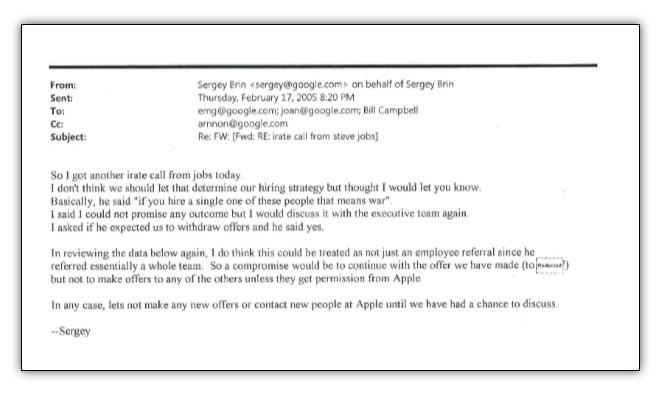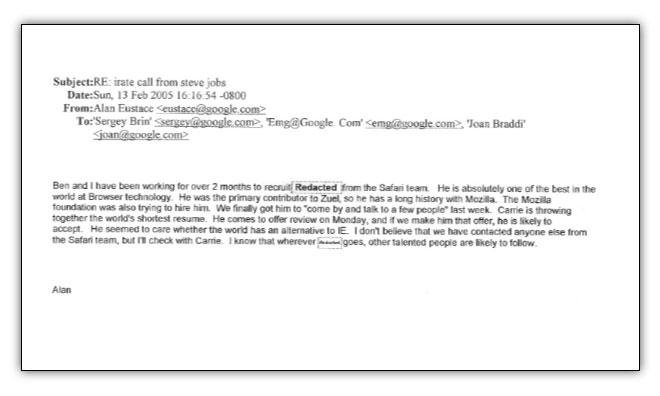Google may have sparked the Silicon Valley anti-poaching scandal when the company infuriated Steve Jobs by attempting to lure members of Apple's Safari team to work on Google's then-nascent browser effort, according to internal emails revealed in new court filings.
Jobs was "very agitated" when he heard of Google's recruiting efforts, Google co-founder Sergey Brin wrote to members of the search giant's executive management group in early February 2005. An agreement not to recruit from one another was in place less than one month later, court documents obtained by PandoDaily show.
"I told him we were not building a browser and that to my knowledge we were not systematically going after the Safari team in particular," Brin wrote following a phone call from Jobs before revealing an internal browser project a few sentences later: "I did not mention we may release an enhanced version [of Mozilla Firefox] but I am not sure we are going to yet," he said.
Former Google engineering chief Alan Eustace and former Google staffing director Arnnon Geshuri followed up, telling Brin that the company had in fact been actively recruiting at least three members of the Safari team. Eustace said that he had been after one of the engineers, whose name was redacted from the documents, for months because that developer was "absolutely one of the best in the world at browser technology."
Brin received another "irate call" from Jobs a few days later, and revealed Jobs's threat in a followup email:
"Basically, he said 'if you hire a single one of these people [from the Safari team] that means war,'" Brin wrote. He then went on to suggest that Google temporarily stop recruiting from Apple's browser team, just nine days before the first mention of the anti-poaching agreement between the two companies.
The pact expanded from there, eventually covering nearly thirty companies ranging from Silicon Valley firms like Apple and Genentech to British media giant NTL and advertising agency Ogilvy. Following a settlement with the Department of Justice, the companies involved are now facing a class action lawsuit alleging that they conspired to drive down wages. That suit is set to go to trial in May.
 Shane Cole
Shane Cole








-m.jpg)






 Thomas Sibilly
Thomas Sibilly
 Wesley Hilliard
Wesley Hilliard
 Marko Zivkovic
Marko Zivkovic

 Malcolm Owen
Malcolm Owen

 Amber Neely
Amber Neely










47 Comments
This might be silly, ad it might be everything that is wrong with tech "fans" today but I love this "wars" and power struggles between this companies. I like to thing that is comparable to what soccer fans feel about their teams. I don't know.
Who knew, Safari had one of the best in the world at browser technology. No wonder Google went with WebKit, monkey see monkey do.
It wasn't conspiring to keep wages down. If top Safari engineers went to some company making fishing rods where they earned more money I don't believe Jobs would have raged. It's top engineers taking trade secrets to a competitor who wants to undermine your sales that makes one rage.
Besides, When you're earning 10 bucks an hour, driving down wages is understandably fretful. But when you're earning 75 bucks an hour, it doesn't quite have the same weight of outrage.
Besides, When you're earning 10 bucks an hour, driving down wages is understandably fretful. But when you're earning 75 bucks an hour, it doesn't quite have the same weight of outrage.
I suspect that the people Google was interested in poaching would be making far more than a mere $75/hr by at least several multiples. Apple, along other big companies, may have broken the law here, but I seriously doubt they cared much at all about "keeping wages down". Apple probably viewed it as a trade secret issue, but primarily they probably didn't want the disruption that would come from losing key people.